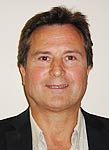 Professor Bradley Stringer BSc MSc PhD
Professor Bradley Stringer BSc MSc PhD
Professor Stringer obtained his bachelors degree from the University of Sussex, UK in 1978. He then moved to the University of Wales College of Medicine where he studied the molecular pathogenesis of cancer using the thyroid gland as a model for proliferative disease. At the College of Medicine he obtained his Masters (1981) and Doctorate (1984), and performed further research into breast cancer until being appointed Assistant Professor at King Faisal Specialist Hospital and Research Centre in Saudi Arabia (1988). Following this appointment he returned to the UK and was appointed as a Patent Examiner (1990) in the UK Patent Office, specialising in Biotechnology. During this time he collaborated with staff at the University of Sheffield in studies to create human cell lines using immortalising genes first identified in cancer cells. He was then given a staff appointment as Lecturer in Molecular Biology at the University of Sheffield in 1993. Using his patent and science knowledge he filed a series of patents from 1995 onwards related to human cells for use in therapy to treat bone loss and Parkinson's disease. In 1997, he co-founded a Sheffield University spin-out company, CellFactors plc, to develop human bone cell derived matrix from immortalised human cell lines; the Skeletex material produced to be used for bone repair and regeneration. In 2001 he was appointed Reader at Sheffield University, and in 2003 he co-founded Lifeforce plc to enable human cells to be isolated from the blood, concentrated, and cryogenically stored under MHRA Regulatory-approved conditions. His current appointment is Professor in Dental Science at Cardiff University, where he maintains a strong research interest in bone cell biology, and the way in which human cells, derived from bone and blood, can be used to help regenerate and repair damaged and ageing tissues.
2007 - Ageing and the Immune System. Should we store a representative sample of our immune systems for use in later life?
Immunosenescence is defined as the progressive decline in the functioning of the immune system that develops with age. It results largely from an accumulation of molecular and cellular alterations that occur to B-cell (which produce antibodies against pathogens) and T-cell (which kill virally infected cells and tumour cells) subpopulations circulating the body. That a decrease in circulating memory B-cells occurs during ageing is now well recognised, and thought to be linked to a reduction in support cell function. Also of particular importance is the decline in our ability to generate naive T-cells after early adulthood. This is due to involution of the thymus gland, which is almost complete by our mid-thirties. Furthermore, about 20% of our T-cell memory pool becomes dedicated to CMV virus-specific T-cells by age 70. Both these age-related changes serve to reduce our T-cell repertoire over time, and therefore reduce the responsiveness of our immune system to the challenge of opportunistic infections and tumours. In view of the known decline in our immune system, and the knowledge of its importance to keeping us healthy throughout life, should we consider storing representative samples of our immune systems now the technology exists? This presentation provides a general overview of the immune system, how its effectiveness declines during ageing, and how we may be able to offset its decline by storing a representative portion of it for our future needs.